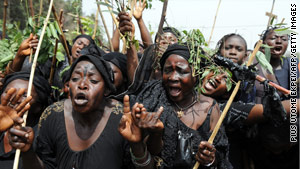The report names more than two dozen countries as offenders. Some engage in what's classically thought of as religious persecution.
Egypt, for example, not only imprisons members of the Baha'i faith and members of minority Muslim sects, but also has some fired from their jobs, kicked out of universities and barred from having bank accounts, driver's licenses, even birth certificates, according to the report.
Other countries, such as Saudi Arabia, export "extremist ideology," the commission charges. But the kind of religious persecution seen in Nigeria and some other countries is "equally egregious," the report says. "Many governments fail to punish religiously motivated violence perpetrated by private actors," it says, warning that "impunity... often leads to endless cycles of sectarian violence."
It calls Nigeria "a tragic case in point," saying that in the most recent outbreak of killing in Nigeria's Jos State several months ago, 500 "men, women and children were hacked to death with machetes and then dumped into wells.
"Not a single criminal, Muslim or Christian, has been convicted and sentenced in Nigeria's ten years of religious violence," the report claims.
The commission did have limited praise for Nigeria's government, saying that when an USCRIF team went to the African nation in March, it found officials "attentive and even grateful for its concerns."
The Ministry of Justice filed 41 prosecutions while the American team was in Nigeria, the report said. Even so, the commission recommended that the United States include Nigeria on a list of 13 nations called "countries of particular concern" which engage in "severe violations of religious freedom."
CNN has reached out to the governments of Egypt, Saudi Arabia, and Nigeria for comment, but has so far not received a response to the report.

